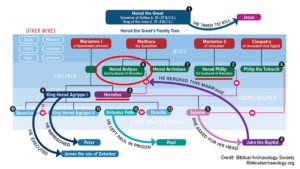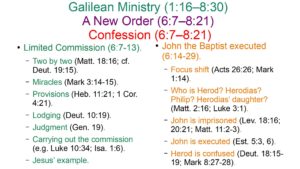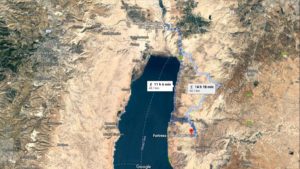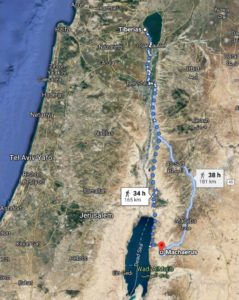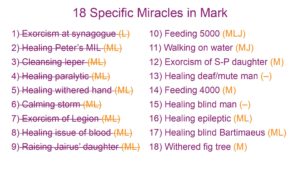The Ministry of Jesus in Galilee
Mark 1:16—8:30
A New King (1:16—3:6).
Kingdom is Near (1:15)
Popularity (1:16-45).
Conflict (2:1—3:6).
Jewish Leaders Reject Him (3:6)
A New Kingdom (3:7—6:6)
Kingdom Has Small Beginnings (4:3)
Continued Conflict (3:7-35).
Parables (4:1-34).
Identity (4:36—6:6).
Jesus’ Town Rejects Him (6:6)
A New Order (6:7—8:21)
Herod & Pharisees (8:15)
Confession (6:7—8:21).
Limited Commission (6:7-13).
John the Baptist Executed (6:14-29).

We now shift our focus to King Herod and John the Baptist.
Who is Herod? Herodias? Philip? Herodias’ daughter?
John is imprisoned.
Josephus records that John was imprisoned in Herod’s fortress at Machaerus which is in Perea by the Dead Sea.
He did this because John preached against the marriage between Antipas and Herodias (Lev. 18:16; 20:21) – even Josephus disapproved of this marriage.

Even so, John could receive guests, as we note messengers from John came to see Jesus (Matt. 11:2-3).
Antipas’ primary place of rule at this time was Tiberias, a city he founded on the coast of the Sea of Galilee (named after Roman Emperor Tiberius Caesar).
Antipas still protected John from Herodias’ ire—he respected John enough to protect him, to fear him, but not to obey him.

In 6:20, we note that he heard John, he “did many things,” and heard him gladly—so when he would often come to Machaerus to listen to John.
“Did many things” is rather confusing, but other manuscripts say that he was uncertain or perplexed at what John taught—which makes more sense.
Despite that, he heard John gladly—Steve Higginbotham calls Herod an admirer of John, and not a follower.
God wants followers who are loyal; admirers will turn against Him when things get tough just as Herod did.
Do you ever wonder why JWs do not celebrate birthdays? Because of the two people who did so in Scriptures, one was a pagan pharaoh (Gen. 40), and the other was Herod Antipas who had John executed.
Of course that’s an odd association to make, but here we are.
It seems this celebration was happening in Machaerus where John was being held, and he summoned the chief men of Galilee to celebrate with him.
Salome, a 16 or 17 year old girl, dances before Herod, her stepfather, and pleases him enough for him to grant him “up to half his kingdom.”
This is a figure of speech that may remind us of King Ahasuerus offering this to Esther because of his love for her (Est. 5:3, 6) – not sure Herod had the authority to give up half his kingdom without approval from Rome.
While Esther asked for something noble (to save her people), Salome asked for something awful—the head of John the Baptist at the behest of her mother Herodias.
Herodias was a schemer and definitely took advantage of this opportunity to get rid of an enemy.
Why did Herodias want John killed? Certainly the text states that he was preaching against her marriage, but why would she care about that? Perhaps she was vindictive, hating that he was reminding her of her sins. Maybe she thought he would turn public opinion against her. Of course now that he was in prison, his only audience was Herod. Perhaps she was worried that John might motivate Herod to repent. Certainly there was a certain level of vengeance she was wanting to carry out: “That’ll teach him to speak against me!” – and quell any other dissenting voices.
In making this vow, some have speculated that Herod was drunk or was aroused by the dance or a combination of both—whatever the case, he was very merry.
Whatever the case, Salome had no hesitation in asking for what her mother wanted (“immediately with haste”), even adding that John’s head be brought in on a platter—they were having a banquet after all. Salome probably held the same animosity toward John that her mother did.
Herod was sorry, but he made an oath in front of prominent witnesses—he felt compelled to keep it despite his earlier fear. This further showed his mere admiration rather than his discipleship.
He sent the executioner to his prison cell and beheaded him—no trial, no sentence, no approval from Roman officials, just an unceremonious end to “the greatest born of women,” as Jesus called him (Matt. 11:11).
Antipas then allowed John’s disciples to come and take his body to be given a proper burial—after this, Matthew records that they told Jesus of it (Matt. 14:12).
Herod is concerned.
Hearing of Jesus’ works as His fame spread, he was concerned that John had arisen from the dead, even though John had done no miracles himself.
Perhaps Herod was worried that John would come back to judge him for having him executed.
Others still had speculations as to His identity: Elijah, the Prophet, one of the prophets—Matthew even adds Jeremiah to the speculation (16:14).
Elijah was said to return (Mal. 4:5-6), though Jesus identifies John the Baptist as the fulfillment of that prophecy (Matt. 11:14; cf. Luke 1:17).
Others thought He might be the Prophet that was prophesied by Moses in Deut. 18:15-19) – and in fact, He was!

Jesus knew of these speculations and asked His disciples later about it and what they thought (8:27-28) – but we’ll get to that as we conclude this section.
